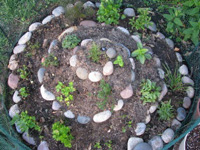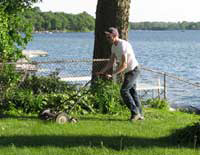Spring Tips
Do a Little, Save a Lot
The days are warm and the nights are cool. The trillium and tulips are emerging from the soil and spring has arrived. This is a great time of year to make choices that will improve air quality and the environment.
Spring is a season of new growth. This is an opportunity to grow and think about making little changes on growing or buying food, taking care of the lawn or commuting to work or school every day. It can be as simple as changing a few light bulbs at home or deciding to bike more often during the week. No matter the changes made, it all adds up to a healthy environment and cleaner air for everyone.
Buy Local
Buy Local Food
market.
Purchase local produce and help reduce air emissions! Fresh produce travels more than 1,500 miles on average before being eaten. That is approximately the distance from Wisconsin to Arizona! Tractor-trailers, which haul much of our produce, get about six miles to a gallon of diesel fuel. Even though they can hold a lot of veggies per load, the emissions add up. For example, each gallon of diesel fuel emits 22 pounds of carbon dioxide, the main greenhouse gas contributing to climate change.
Driving a tractor-trailer 1,500 miles (not including idling time) emits about 5,550 pounds of carbon dioxide, which is almost the same as what an average passenger car emits in seven months! Other air pollutants released in vehicle exhaust include nitrogen oxides, carbon monoxide, volatile organic compounds and particle pollution. Wisconsin is lucky to have farmers' markets around the state where fresh produce can be purchased directly from growers. Find out about farmers markets [exit DNR] around Wisconsin.
Grocery stores are carrying more local produce because of consumer demand. Ask the grocer where the store's produce comes from and let them know local products are preferred.
Grow Your Own
Grow Your Own
Spring is a time for new beginnings.
Never tried growing a garden? Why not start this year? No matter the amount of time, money or outdoor space, there is a garden that can suit any lifestyle. Growing produce has many benefits:
- It could not be fresher!
- Try heirloom varieties that most grocery stores do not offer.
- Have family help in the garden. Eating homegrown produce encourages healthier diets.
- Know how the plants were treated, for example, with or without synthetic chemicals.
- Save money on grocery bills and on gasoline for trips to the store.
- Be less reliant on far away producers and the complex transportation system to feed the family.
- Reduce emissions by lessening the energy needed for packaging, processing, and storing food, as well as the number of miles food travels from farm to plate. In addition, artificial fertilizers, pesticides and meat production can be energy-intensive; further limit emissions by using organic gardening practices and shifting diets to contain more homegrown vegetables and less meat.
Spring cleaning… the garden?
Compost the dead plant debris rather than burning it. Use the lawnmower to mulch the accumulated leaves and use them as mulch on the garden. Or, if available, get shredded bark from the town, city or county rather than buying the mulch that has been trucked from afar.
Green
Lawn Care
Practice Green
Lawn Care
the day, if possible.
Keep in mind the following energy and emission-saving yard care tips.
- Replace gas-powered equipment such as mowers and leaf blowers with electric, rechargeable or manual equipment.
- If using gas-powered equipment, fill and use it in the evening hours, and buy a spill-proof, low-emitting gas can.
- Keep mower blades sharp and undersides clean - the lawn will look better and the mower will be more efficient.
- Use lawn clippings as mulch for the garden. It will help save on clipping disposal and buying mulch.
- Do not burn leaves or trash. Compost or recycle instead.
- Water the lawn in the evening or early morning. Mid-day the water will evaporate faster, preventing grass roots from soaking up the water necessary for growth. To stay green, established lawns need about 1 inch of water per week in total, split over two or three applications. Purchase or make a water gauge to measure the amount of water (including rain) that falls on the lawn each week to help avoid wasting water.
- Set up barrels to collect rainwater for the lawn or garden. Using rain barrels will not only reduce the amount of water, energy, and cash (for water pumping and/or treatment) spent on lawn care, it will also decrease the amount of stormwater runoff polluting our streams and lakes.
- Mow less. Ask a local nursery for slow-growing, drought resistant grass and seed mixtures.
- Try native landscaping [PDF exit DNR] to minimize lawn mowing, watering and fertilizing.
- Native Plant Nurseries in Wisconsin
Save Energy At Home
Save Energy At Home
- Looking to make some energy-efficient improvements to your home? Visit the Focus on Energy Home Energy Rebate page for information on currently available rebate programs and upcoming federally funded rebate opportunities.
- Conserve energy by turning off lights when leaving a room and turning off computers and televisions when not in use.
- Purchase energy efficient lighting or use natural lighting whenever possible.
- Find appliances that include the Energy Star [exit DNR] label.
- Install windows that are energy efficient.
- Buy green power, energy made by using renewable energy such as wind, solar, geothermal or hydropower.
- Ensure there is plenty of natural ventilation to cool the house as the weather warms up. Open windows at night for the naturally cooler air and close them during the day to keep the cool air inside.
- Control the moisture entering the house by providing sufficient landscaping drainage and gutters. A dehumidifier may help make the climate of the house feel cooler.
- Use window shades to keep sunlight from warming the house too much during the day.
- Provide landscaping to create a microclimate around the house. Trees and shrubs can increase shade or provide a windbreak.
For more information about conserving energy at home and reducing carbon footprints, Focus on Energy [exit DNR].
Video
This video shows some ways to save energy around the house.
Travel Wisely
Travel Wisely
Spring is a great time to get outdoors after a long winter. Consider biking when commuting to work or running errands around town. Below are some other suggestions on ways to improve air quality:
- Ride a bike or walk instead of driving. It is a great way to travel, get in shape and reduce air pollution. Vehicles on the road create more than 25% of all air pollution nationwide and are a huge source of global climate change emissions.
- Combine errands into one trip. Several short trips taken from a cold start can use twice as much fuel as a longer multi-purpose trip covering the same distance when the engine is warm. Combining errands reduces the distance traveled, not only saving fuel but also wear and tear on vehicles.
- When driving, anticipate stops and slow down gradually. It takes 20% less gas to accelerate from 5 mph than from a full stop.
- Get rid of excess items in the trunk. The weight of the extra cargo makes engines work harder, burning more gas, releasing more emissions. Gas mileage drops 4% for every 100 pounds of excess weight carried in the car. That can cost about a dollar every time the gas tank is filled.
- To learn more about choosing a greener vehicle and minimizing environmental impacts visit
Video
Learn some eco-driving tips in the video below.





